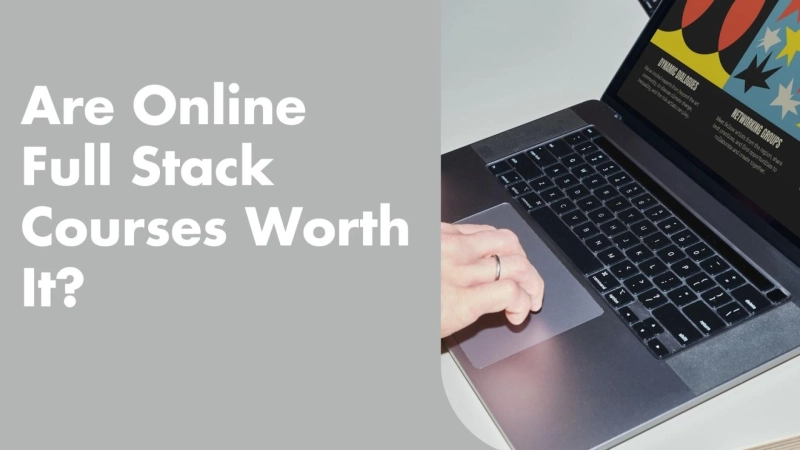The demand for full stack developers is rising as companies seek professionals who can handle both front-end and back-end development. With this growing demand, many aspiring developers are turning to online platforms to gain the skills needed to enter this career. But the question remains- are online full stack courses worth it?
This article explores the value of online full stack courses, weighing their pros and cons, and outlining key factors you should consider before enrolling.
What is a Full Stack Developer?
Before we dive into the course format, let’s briefly understand what a full stack developer does. A full stack developer is someone proficient in both front-end technologies (like HTML, CSS, and JavaScript) and back-end technologies (like Node.js, Python, Ruby on Rails, etc.). They’re capable of building complete web applications, from designing user interfaces to managing databases and server-side operations.
The Rise of Online Learning in Tech
Over the last decade, online learning has transformed how people gain technical skills. From YouTube tutorials to structured MOOCs (Massive Open Online Courses), learning has become more accessible, affordable, and self-paced. Particularly in tech, online courses have exploded in popularity because:
- Tech skills are in demand
- Learners seek flexibility
- There's an abundance of updated content
- Bootcamps and platforms offer project-based learning
But with convenience comes the question of value—do online full stack development courses offer the same weight and impact as traditional classroom programs?
Key Factors to Consider Before Enrolling in an Online Full Stack Course
1. Course Content and Curriculum
A solid full stack course should offer comprehensive coverage of both front-end and back-end development. Key areas to look for include:
- HTML, CSS, JavaScript (including frameworks like React or Angular)
- Server-side languages (Node.js, Python, PHP, etc.)
- Database management (SQL and NoSQL databases)
- RESTful APIs and version control (like Git)
Also, check if the curriculum aligns with real-world job requirements and includes capstone projects or hands-on assignments.
2. Quality of Instruction
The effectiveness of an online course often depends on the quality of instructors. Look for courses led by industry professionals who have practical experience. Reviews and ratings can help gauge the instructor's teaching style, responsiveness, and subject-matter expertise.
3. Project-Based Learning
One of the strongest indicators of a worthwhile course is its emphasis on real-world projects. Full stack developers are expected to build and deploy end-to-end applications, so practical application of skills is essential. A good course should:
- Encourage building multiple mini-projects
- Include a final project simulating a real-world app
- Provide opportunities to build a portfolio
4. Flexibility and Time Commitment
One of the biggest advantages of online learning is flexibility. But it's also easy to lose momentum if the course isn't structured or if you're juggling a full-time job.
Ask yourself:
- Is the course self-paced or scheduled?
- Does it allow flexible deadlines?
- How many hours per week are expected?
If you're a working professional or student, self-paced formats with optional deadlines might work better for you.
5. Mentorship and Support
Despite being remote, the best online full stack courses offer:
- One-on-one mentorship
- Group Q&A sessions
- Peer collaboration
- Prompt feedback on assignments
This support system can be invaluable, especially when you’re stuck debugging code or need career guidance.
6. Placement Assistance and Career Support
While not all online programs offer job placement help, many reputable platforms provide:
- Resume building assistance
- Mock interviews
- Career counseling
- Direct referrals to hiring partners
This is a key differentiator when choosing between free resources and paid programs.
Pros of Online Full Stack Courses
1. Affordability
Most online courses are significantly cheaper than traditional bootcamps or college degrees. There are free options too, though premium courses with certificates or placement support usually charge a fee.
2. Accessibility from Anywhere
Whether you’re in a metro city or a remote town, online learning breaks geographical barriers. For example, many learners today are enrolling in an online full stack development course in Delhi, Noida, Gurgaon, Pune, and other parts of India, a clear indication of how digital platforms are reaching wider audiences across the country.
3. Learn at Your Own Pace
Self-paced learning is ideal for people who prefer learning at their own speed without the pressure of fixed class schedules.
4. Portfolio Development
Online courses often emphasize project work, enabling you to showcase your skills to potential employers via GitHub or a personal portfolio website.
Cons of Online Full Stack Courses
1. Lack of In-Person Interaction
For some learners, the absence of face-to-face interaction can hinder learning. Discussions, brainstorming sessions, and peer coding in physical classrooms offer a different kind of engagement.
2. Requires High Self-Motivation
Without regular schedules or peer accountability, it’s easy to fall behind. Online learners must be highly self-disciplined.
3. Not All Courses Are Created Equal
Some courses may have outdated content, poorly structured modules, or insufficient support. This makes research and reading reviews essential before enrolling.
Who Should Choose an Online Full Stack Course?
Online full stack courses are ideal for:
- Working professionals seeking a career change
- College students looking to supplement their learning
- Freelancers aiming to broaden their skillset
- Entrepreneurs wanting to build their web applications
However, if you're someone who thrives in a guided, in-person environment and struggles with time management, you might want to consider hybrid or offline formats.
How to Evaluate the Right Online Course for You
When selecting a course, look beyond marketing promises and focus on:
- Verified alumni success stories
- Curriculum transparency
- Access to mentorship and feedback
- Long-term support and job preparation
Also, consider trialing a short module or demo lesson before committing financially.
Conclusion
So, are online full stack courses worth it? The answer lies in your learning style, career goals, and discipline level. When chosen carefully, online courses can be a powerful and cost-effective path to becoming a full stack developer—especially in today’s digital-first world.



